Brain Research – From Filler to Fulfiller
Rick and Sally Doughty
Cerebellum has to do with balance and coordinates the thinking in your mind
· Normal cerebellum activity is in the back of the brain
Hole generally means that there isn’t much activity – dead brain areas
Head trauma – brain damage to front of her brain – prefrontal cortex… normal childhood but had trouble making good decisions
Prefrontal cortex is the last part to develop - works, but is very slow for awhile, is the part that helps you make good decisions
· Gives you focus
· Forethought
· Judgment
· Impulse control
· Organization
· Planning
· Empathy
· Learning from mistakes
PFC Problems
· Short attention span
· Impulsive
· Procrastination
· Disorganization
· Poor judgment
· Lack of empathy
· Bad at learning mistakes
PFC exercise
· Goal setting/problem solving PFC function
· One page miracle
o Relationships
o School/work
o Money
o Body
o Mind/spirit
o http://www.amenclinics.com/my-brain-health/brain-health-club/fifteen-days-to-a-better-brain/the-one-page-miracle/
Emotions come on-line before good decision makings come
Many times murderers have problems in the limbic system – make bad decisions…. Pre frontal cortex has less neurons – pre frontal cortexes aid with empathy
The more you exercise your brain areas, the more it grows.
Filler to Fulfiller
Kids are generally on track developing if they’re 18 months ahead or behind
Filler – 0 to 3 yrs approx.
· brain develops back to front
· mirror neurons
o mirror what you do
· atmosphere of home key
o safe, secure, loving vs stressful, chaotic, rude
o ladies usually gifted in this
· attunement and implicit learning
· TV bad…
Follower – 3 yrs to 12 yrs approx.
· want to emulate or follow something or someone
· add in explicit learning
· being actively involved, directing, teaching
· school readiness
· control exposures – who influences
· give choices to the children
· goal setting/problem solving
· how to help:
o evaluate and encourage ability to
§ function apart from mom and dad
§ direct attention
§ follow directions
§ interact socially
§ take turns
§ make choices
§ be self-aware
o when you talk to kids, show – don’t tell. Ex. In line when kids are all crazy say “you look like this” and show them.
o When kid is being fussy… “you are doing this… show… what you mean is ‘down please.’”
o Be a role model they can follow
o Goal setting/problem solving
o Provide physical activity
§ Book like Why Zebras Don’t Get Ulcers are good to read
Finder – 12 to 20 years approx,
· Explosion of neural connections and pruning
· Key new areas of the brain come on-line
o Novelty seeking, risk taking, oppositional, emotional
Fulfiller – 20+ years approx.
· Brain not fully developed until about 25
· As with all the years good nutrition is important
· Be a part of the support system without rescuing


